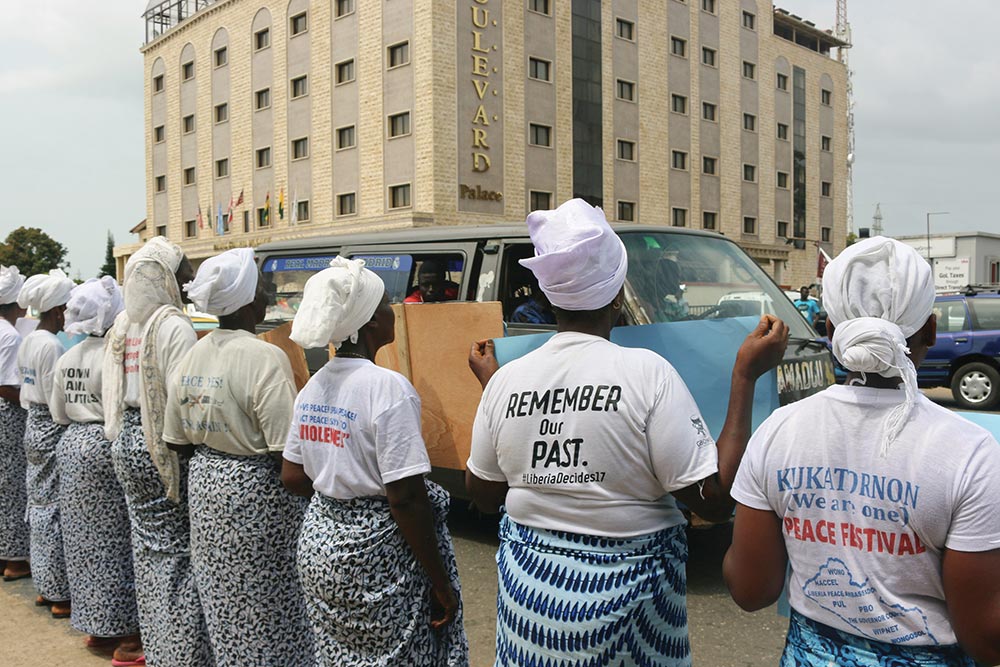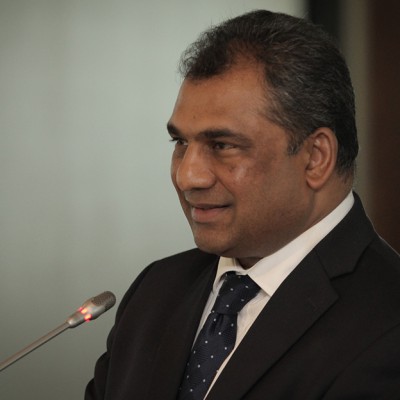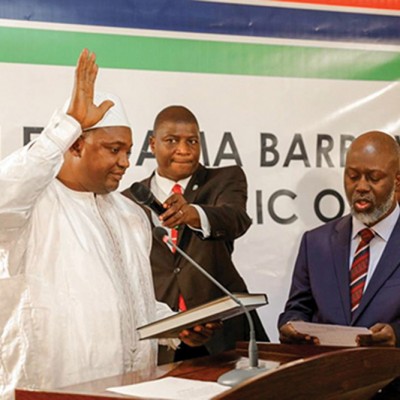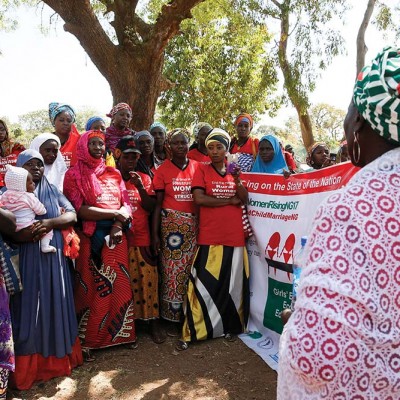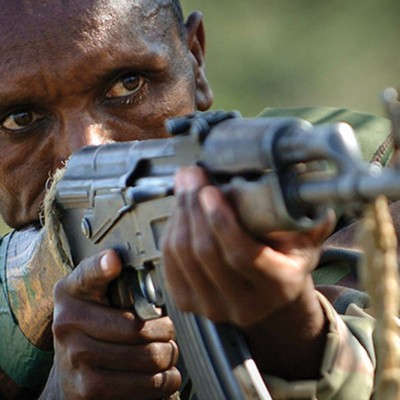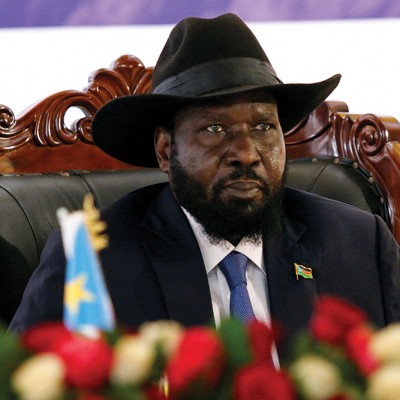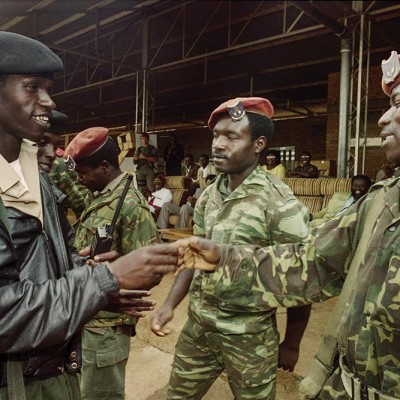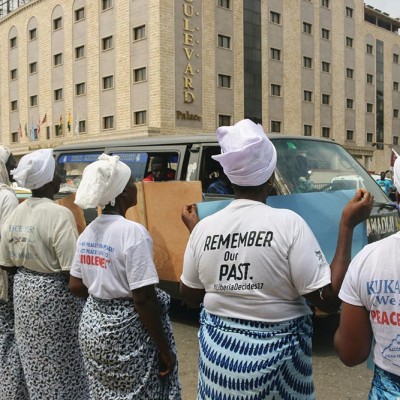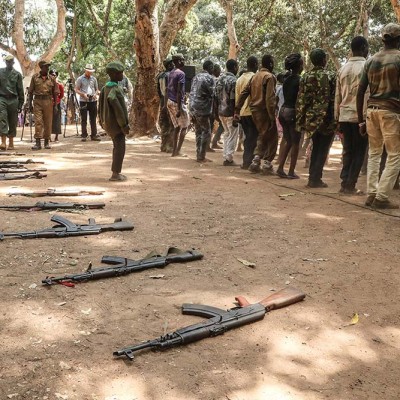Introduction
To avoid the recurrence of patterns of marginalisation, oppression and neglected grievances that drive groups to conflict in the first place, an inclusive approach to conflict resolution is often considered key. The three United Nations (UN) peace and security reviews – conducted in 2014-2015 on peace operations, peacebuilding and the implementation of UN Security Council Resolution (UNSCR) 1325 – highlighted an inadequate recognition among member states and within the UN system of the potential of fully integrating a gender perspective into peace and security processes.1
The absence or low level of African women’s participation in mediation and at the peace table is the unfinished business of UNSCR 1325. The 1994 Kampala Action Plan on Women and Peace2 recommended the creation of a mechanism to facilitate the involvement of African women leaders in the prevention, management and resolution of conflict at the highest levels. Following such early commitments, women have mobilised for peace and participated in the processes in different countries such as the Democratic Republic of the Congo (DRC), Rwanda, Burundi, Kenya and Liberia, to name but a few. However, much more needs to be done to further realise the optimal benefits of having women as mediators, part of mediation teams, part of negotiating parties, as signatories, as observers and in other substantive roles in peace processes.
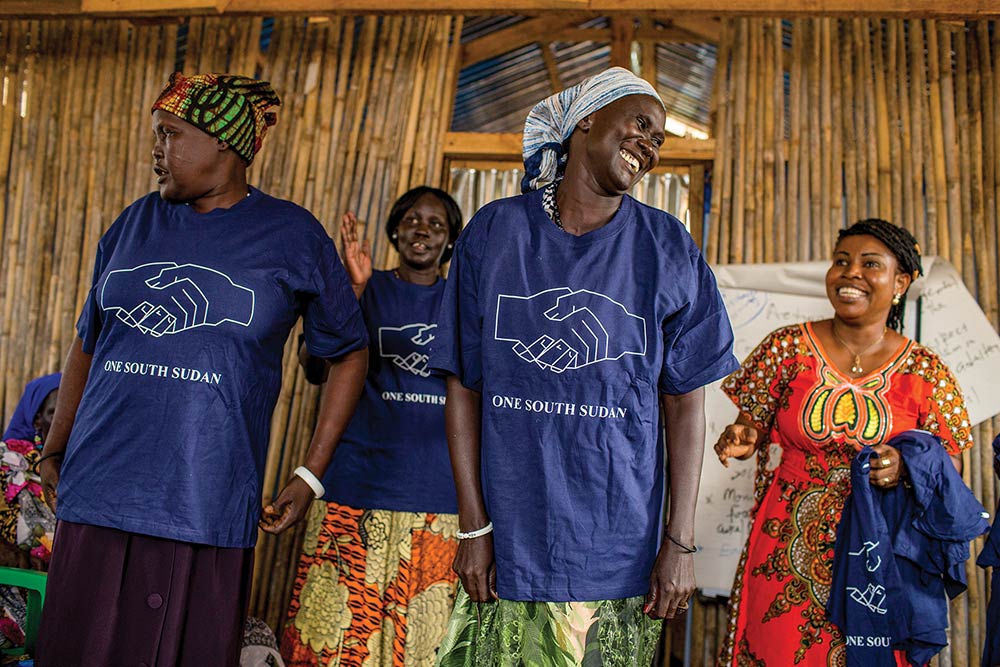
The capacities, expertise, lessons and good practices from the experiences of women mediators and women mediation experts can inform and strengthen mediation processes. However, there is a disconnect between the available mediation capacities of women and the formal and informal peace processes. There are efforts to bridge this, in some cases, through organised approaches such as networks and associations that bring the experiences of women in mediation to a common or/and shared platform, for ease of access and use.
This article discusses the emergence of and the role of networks for women mediators, and their impact in responding to needs and gaps associated with the different aspects of mediation support in Africa’s mediation efforts.
Challenges Hindering Women’s Participation in Mediation
For peace initiatives to remain sustainable in the long term, women must be included in every level of the process. Yet, current formal peace processes often remain largely male-dominated, while women are simply seen as war victims and/or are often not given enough space to engage effectively in peace processes. While there has been marked improvement in inclusivity, challenges still exist that impede the involvement of women in peace processes. Some of these challenges include lack of access to formal processes by women mediators or women with mediation expertise. In some cases, women lack sufficient and sustainable funding to support the peace process directly or indirectly. Sometimes, women lack the capacity and experience in mediating conflicts, and this locks them out from opportunities to be involved in mediation efforts. There are insufficient trained women mediators in most African countries; even where they exist, they are mostly involved at the grassroots and in local mediation efforts, but absent in high-profile mediation or negotiations. To ensure the active participation of women mediators, there must be increased training of women in negotiation and mediation skills.

Women remain drastically under-represented in peace processes. This is not entirely due to lack of capacity, but also due to lack of power and access. In most African contexts, patriarchy continues to play a key role in excluding women from formal and informal peace processes. Further to this, culture, perception and beliefs play a key role in entrenching the exclusion of women in peace processes, and in some contexts, men already represent women’s and general societal needs. For example, when women show interest in participating in local peace processes, they are seen by men as violating culture and tradition – stereotypes that have often placed women at the margins of decision-making. In some contexts, peace processes have been – and continue to be – highly militarised with a heavy security-oriented approach, which has been considered a man’s world, further discouraging women from getting more involved. The imbalance between what is offered and what is needed in mediation support further complicates the provision of tailored mediation support by women mediators and mediation experts. Also, in many cases, the mediators and mediation teams have had challenges in accessing the mediation capacities of women, citing reasons such as the women were not well known. Thus, networks have gained momentum as a platform to consolidate the experiences of women mediators and make it easy for them to be accessed, in a more structured manner.
Emergence of Networks of Women Mediators
While important gains have been made in the implementation of UNSCR 1325, formal peace processes have lagged behind in effectively engaging and meaningfully involving women as members of the teams facilitating and leading peace processes. Research shows that between 1992 and 2011, only 2% of chief mediators, 4% of witnesses and signatories, and 9% of negotiators in peace processes were women.3 The inclusion of women during peacemaking processes has, however, seemed to focus on mobilising women outside of peace processes, rather than in securing their participation within formal peace processes.4 In seeking to create space for women’s engagement in mediation processes, several networks have been established at national, regional, continental and international level. In a global context of increasingly complex and interconnected challenges, there is growing evidence to suggest that multiple collaborative efforts are perhaps the most comprehensive way of addressing these challenges and envisioning a collective future. This momentum has seen the rise of networks of women mediators that seek to increase the number of women who are actively involved in local, continental and international peace mediation efforts.
Some Networks/Platforms for Women Mediators in Africa and other Continents
| Network | Region |
| Network of African Women in Conflict Prevention and Mediation (FemWise-Africa) | Africa |
| Association of African Women Mediators (AAWMN), South Africa | Africa |
| Women Network for Peace and Dialogue, Burundi | Africa |
| Women in Peace Network (WIPNET), Liberia | Africa |
| Mano River Women’s Peace Network (MARWOPNET) | Africa |
| South Sudan Women’s Peace Network | Africa |
| Sudan and South Sudan Joint Women’s Task Force for Peace | Africa |
| Regional Faith Women Peace Mediators Network | Africa |
| N-Peace Network | Asia |
| Sangat | South Asia |
| Swedish Network of Women Mediators | Europe |
| Nordic Women Mediators’ (NWM) Network | Europe |
| Peace Women across the Globe (PWAG), Switzerland | Europe |
| Mediterranean Women Mediators Network | Mediterranean |
| Syrian Women’s Advisory Board to the UN Special Envoy for Syria | Middle East |
| Commonwealth Network of Female Mediators (to be created)5 | Commonwealth |
| Global Network of Women Mediators (to be created)6 | Global |
Network of African Women in Conflict Prevention and Mediation (FemWise-Africa)7There is no doubt that women should have an integral part in decision-making during peace processes. To increase women’s access to, and participation in, peace mediation and negotiation in Africa, women’s capacity in mediation and negotiation skills needs to be improved. The impact of women’s role in peace processes also needs to be better exposed and reflected on to ensure that gains made are not reversed. Against this backdrop, the AU has taken three landmark decisions,8 ultimately leading to the establishment of the FemWise-Africa. FemWise-Africa aims to strengthen the role of women in conflict prevention and mediation efforts in the context of the African Peace and Security Architecture (APSA). The network provides a platform for strategic advocacy, capacity building and networking aimed at enhancing the implementation of the commitments for the inclusion of women in peacemaking in Africa. Priorities of FemWise-Africa:
|
Importance of the Networks to Women Mediators
The networks seek to broaden access and space for women’s participation in peace processes, as well as to enhance their participation in peace processes. Thus, most networks of women mediators serve as a repository of women experts in conflict resolution to be deployed in mediation. The networks also provide a platform for sharing good practices, expertise and peer-to-peer learning, where women engaged in mediation in different contexts learn from each other. For example, women in the networks working at Track 2 and Track 3 mediation efforts can benefit from the experiences of women engaged in Track 1 mediation efforts, often on the dynamics of the highly political formal processes. The women engaged in Track 1, on the other hand, can also learn and benefit from the experiences of women working in Track 2 and Track 3, more particularly on the issues affecting women and the community at grassroots level. Thus, bringing women involved in Track 1, Track 2 and Track 3 together can be a powerful partnership and learning approach for women peacemakers on the ground, who are often not in the spotlight.
The networks also seek to provide a coordinated approach to influencing policy processes at different levels on issues relating to women’s participation in peace processes, as well as in other areas. In this regard, the presence of the networks makes it easy for local women peacemakers to be linked with formal processes. This also ensures that their work translates into influence and impact.
The networks have also been credited for activating and multiplying the role of women in community-level peacemaking. In Burundi, the Women Network for Peace and Dialogue, with 534 mediators, has engaged in resolving conflict. By their count, working as community peace mediators, the women mediators have addressed over 5 000 conflicts at the local level in 2015. They also initiated dialogues in 17 provinces with political actors, security forces and civil society.10 The networks have identified and exposed “hidden” women mediators who are working in community-level mediation processes – experiences often not known at local, national and international level. They also provide a pool for appointments of women as lead mediators and special envoys.
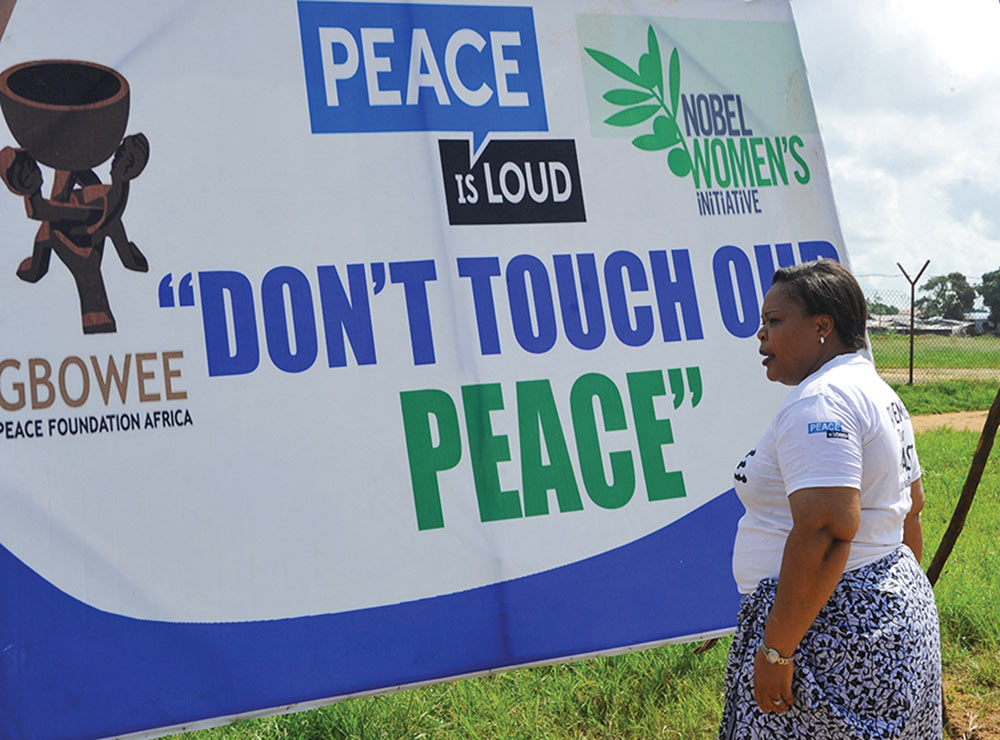
The networks have created opportunities for training women in mediation, negotiation and other mediation-related thematic areas, further equipping women with necessary skills. In addition, the networks provide a platform for mentoring young women to be an integral part of peace mediation, so building a strong base for current and future generation of women mediators. Some networks, such as those at regional and continental level, have brought together women who are part of smaller networks (often at national or community level), linking their efforts to those of the regional economic communities/regional mechanisms (RECs/RMs) and the African Union (AU). The networks have also provided women and society at large the space for reconciliation between divided groups, where women use the networks as a space for dialogue. For instance, in Burundi, the Women Network for Peace and Dialogue was developed in light of the ongoing need for reconciliation, post-civil war in the country.11 Women in other countries such as South Sudan have also used the networks as platforms for dialogue aimed at reconciliation.
Importance of the Networks of Women Mediators for Mediation Support
Why do these networks of women mediators continue to emerge? Having names in a database or a roster is one thing, but that these women have the necessary skills to respond to gaps in mediation support is key. Women in the networks can support peace processes, and mediators, special envoys/representatives, mediation teams and other mediation actors can access these women in the networks. These networks are an important option that exists for improving the quality of mediation support.
There are several roles that networks of women mediators play in supporting mediation:
- Accessibility to women mediators and women experts and practitioners working on mediation and other areas key to mediation processes: Women are excluded in mediation processes, sometimes for the reason that there are no competent or high-profile women with adequate experience and skills to lead the mediation process. By having these women with mediation experience in a known database, the networks increase mediators’ access to the women. Further, the networks have a membership of women with different levels of expertise and experience in mediation. Most of these women are often not known by the mandating institutions. Their presence in the networks continues to increase opportunities for their engagement in formal and informal mediation processes. Special envoys, mediators and their teams can access the women in the networks, and this allows them to know who the supporters of the process are even before they arrive in the country.
- Rapid identification and deployment of qualified women: Often, where there is a need for quick deployment, institutions note that they do not have a roster of women who are available immediately for deployment. Thus, the availability of women who are trained and have prior experience in mediation makes it easy for the rapid deployment of women mediators. The networks can therefore be linked to operational and expert mediation standby teams.
- Access to lessons and good practice from women’s experiences in mediation: The networks create opportunities for women mediators to document their experiences in mediation, with the aim of developing recommendations for strengthening future mediation efforts. This research and documentation undercuts the argument that there are no qualified women who can contribute to mediation processes effectively, especially in formal peace processes.
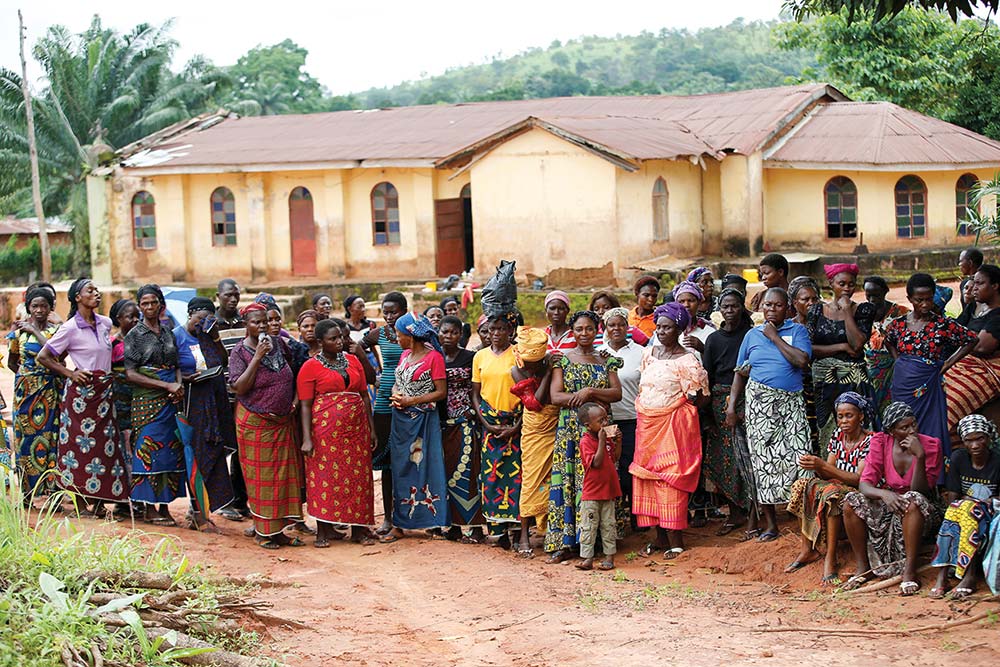
- Research and analysis: Most women in the networks already undertake research on the various issues and aspects of the conflict in which the mediators will be engaging. The African Centre for the Constructive Resolution of Disputes (ACCORD) is an example in this regard, noting that the research output of ACCORD feeds into the work of FemWise-Africa. The mediators and mediation teams can work with these networks to strengthen mediation-specific conflict analysis and to help in triangulating the information that mediators and mediation teams get from their sources.
- Commission, publish or prepare position papers: Like the role played by women’s groups and networks during Kenya’s 2008 peace talks,12 women within the networks engage in constructive dialogue and submit position papers on common issues in the peace process, further making recommendations to the mediators, special envoys or representatives on gender and other thematic issues to be included the discussion. These insights contribute to a more comprehensive understanding of the situation and enhance the ability of the mediators to explore alternative proposals for the resolution of the conflict.13
- Structured and consistent engagement with women peace actors: Mediation teams with the mandate to address an extensive range of issues need to speak with a broad range of stakeholders to forge an understanding of the situational dynamics and perspectives that contribute to a conflict context.14 When mediators consult women’s groups, it is often a once-off consultation among many other special interest groups, thus leaving (often male-dominated) mediation teams attempting to unpack complex women’s agendas after only a single consultation with women’s groups. The networks provide a platform for more structured and consistent engagement with women who are working on peace processes; these women can then reach out to other women in the community to support the official peace process. This was seen in Kenya’s 2008 peace process, where the AU Panel of Eminent African Personalities made a deliberate move to ensure that stakeholders such as civil society organisations and women were given an effective voice in the mediation process. This approach was made easy because of the networks. In some cases, such as in the peace process in Syria, the mediators convene a women’s advisory committee to ensure that women have access to the mediators and are invited to provide input to the mediator’s work. These are experiences that can be strengthened in peace processes in Africa. These networks have been helpful in proposing the names of qualified women to be part of mediation teams, as well as in providing support to women to be part of such advisory committees. In some cases, the mediators establish sub-commissions on gender, and qualified women who are in the networks may be selected to join such committees.
- Provision of technical expertise: The AU and RECs/RMs can also draw mediation expertise from the networks. The women in the networks have gender expertise and perspectives from different contexts and regions. Thus, these women can provide substantive support – for instance, in conflict analysis, in assessing the differentiated impact of armed conflict on men and women, and in identifying gender dynamics and the unique opportunities and challenges for peacemaking in their contexts. The networks can also play an important role in advancing inclusivity by offering alternative approaches to women’s engagement in peace processes. In addition, they can assist in explaining how normative frameworks and cultural settings are structured in the context in which the mediators will be operating. Monitoring, verification and reporting mechanisms are critical for the implementation of cessation of hostilities or ceasefire agreements. The inclusion of women in such mechanisms facilitates access to information and reporting on violations against survivors and witnesses, such as conflict-related sexual violence.
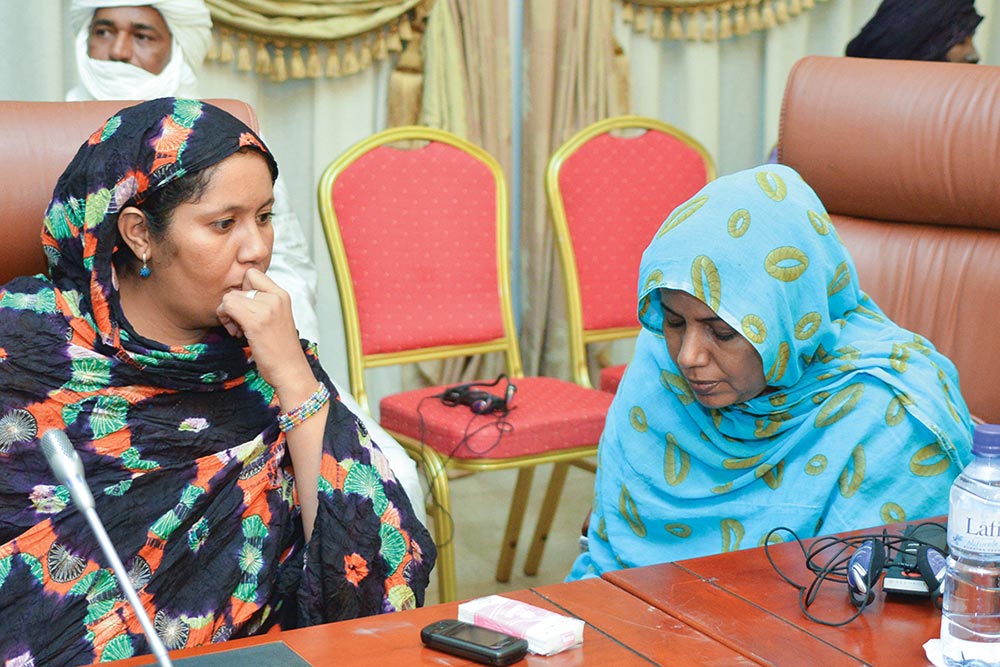
- Training of negotiating teams and the community: The women and organisations in the networks have expertise in delivering training on mediation, negotiation, dialogue and other key areas relevant to the mediation process, including gender, human rights, reconciliation and electoral processes, among others. Mediators and mediation teams benefit from these capacity-building efforts aimed at the negotiating teams, the parties to the conflict and the community at large.
- Trust-building and confidence-building in the process: Often, mediation teams may be small and have a short period of time to engage in effective trust and confidence-building in the peace process. Mediation teams can leverage the trust-building skills, experience and connections of women in the networks with other women and the community. Formulating a two-way communication strategy for informing the wider society of the mediation progress, and for soliciting suggestions for consideration at the table, is an important means of building trust. The connection of the women in the networks is key in this regard.
- Bridge intergenerational gaps: A challenge for mediators and the mediation process is inclusivity. Increasingly, mediators, mediation teams, mandating institutions and negotiating parties are being asked to include women in their processes. Young women are frequently part of movements demanding change, but tend to be excluded from peace and transition processes. If women are included at all, they are usually older and better-connected woman leaders.15 FemWise-Africa, for instance, has a provision for mentoring young women who are interested in mediation and other related peace processes. This will assist the mediation team to easily find and access young women who can be involved in mediation efforts.
Conclusion
Conflict and post-conflict environments in Africa present unique challenges and opportunities for women. There have been some positive trends in addressing certain of the challenges that plague women in these societies. However, these successes are small when the grander scheme of challenges are considered, especially involving women in peace processes. Mediation is a broad and rapidly growing field and there is a need for inclusivity, representation, greater solidarity and collaboration. Mediation strategies that systematically include women are more likely to generate broad ownership and support for a negotiated settlement, as well as lead to a more sustainable peace. With the increasing number of networks of women mediators, it is expected that women’s capacities available in these networks will contribute to strengthening mediation support in Africa.
Endnotes
- Security Council Report (2017) ‘Women, Peace and Security: Closing the Security Council’s Implementation Gap’, Available at: <http://www.securitycouncilreport.org/special-research-report/women-peace-and-security-closing-the-security-councils-implementation-gap.php> [Accessed 10 June 2017].
- United Nations Economic and Social Council and United Nations Economic Commission for Africa (1994) ‘Kampala Action Plan on Women and Peace: Adopted by the Regional Conference on Women, Peace and Development (jointly organised by OAU, UNECA and the government of Uganda, Kampala, 22-25 November 1993)’, Available at: <http://repository.uneca.org/handle/10855/14879> [Accessed 22 June 2017].
- UN Women (2012) ‘Women’s Participation in Peace Negotiations: Connections between Presence and Influence’, Available at: <http://www.unwomen.org/-/media/headquarters/attachments/sections/library/publications/2012/10/wpssourcebook-03a-womenpeacenegotiations-en.pdf?la=en&vs=1159> [Accessed 24 January 2018].
- Bell, Christine (2004) Women Address Problems of Peace Agreements. In Coomaraswamy, R. and Fonseka, D. (eds) Peace Work: Women, Armed Conflict, and Negotiation. New Delhi: Women Unlimited.
- The UK government’s campaign on women in mediation, building on the National Action Plan on Women, Peace and Security, will include the creation of a Commonwealth network of female mediators.
- The Nordic Women Mediators Network, in dialogue with the UN, has undertaken to initiate a process with the aim of establishing a global network of women mediators in the fall of 2019. Such a network will have the overarching goal to promote women’s increased participation in peace processes. As part of this process, the Nordic Women Mediators Network is organising a meeting in March 2018 to discuss the development of a global network of women mediators.
- Terms of Reference of the Network obtained from Secretariat of the Panel of the Wise, African Union Commission (AUC) (n.d.) ‘Operationalisation of “FemWise-Africa”: General Information’, Available at: <http://www.peaceau.org/uploads/final-concept-note-femwise-sept-15-short-version-clean-4-flyer.pdf>
- The 2010 Decision of the African Union (AU) Peace and Security Council (PSC) asking the Panel of the Wise to undertake a study on women in armed conflicts; the 2014 Decision of Ministers of Gender calling for the creation of an association of women in mediation; the 13 March 2017 Decision of the PSC to create FemWise-Africa.
- Peace processes take place at different societal levels (tracks) and are often supported by external third parties. The first level (Track 1) comprises the leadership of a country (for example, political and/or military). The second level (Track 2) covers leading figures in society such as religious dignitaries, intellectuals, political parties and regional power figures. Track 3 comprises leading civil society figures at the local level, and grassroots initiatives. For more, see: Initiative Mediation Support Deutschland (IMSD) (2017) ‘Basics of Mediation: Concepts and Definitions’, Available at: <http://www.peacemediation.de/uploads/7/3/9/1/73911539/basics_of_mediation_concepts_and_definitions.pdf>
- UN Women (2016) ‘Women Mediators Promote Peace in Burundi’, Available at: <http://www.unwomen.org/en/news/stories/2016/1/women-mediators-promote-peace-in-burundi#sthash.F4Cwd4co.dpuf> [Accessed 16 July 2017].
- Ibid.
- In preparing for the talks, the AU Panel of Eminent African Personalities sought the views of the different stakeholders, including women, and listened to their concerns and recommendations. This helped them to elaborate the agenda for the negotiations. The women’s organisations within civil society were able to come together to articulate a position for women. This was done through the creation of a common document expressing a unified position, which was handed to the AU Panel. Some of its provisions found their way into the final agreement.
- United Nations Department of Political Affairs (2017) ‘Guidance on Gender and Inclusive Mediation Strategies’, Available at: https://peacemaker.un.org/sites/peacemaker.un.org/files/1.%20English%20-GIMS.pdf [Accessed 24 May 2017].
- Ibid.
- Ibid.

